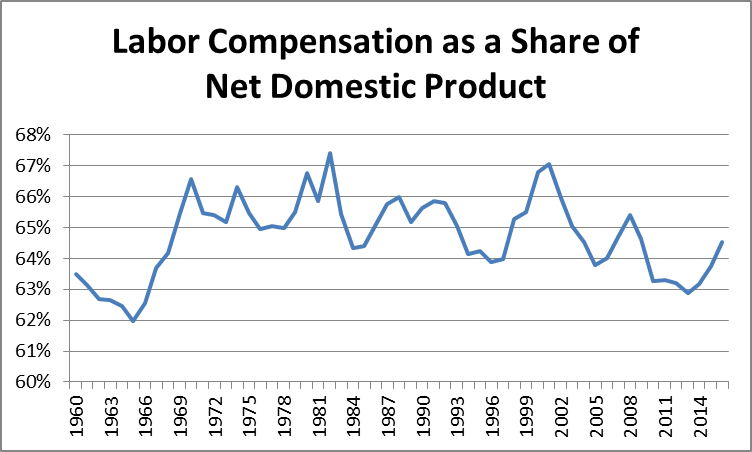Article • Dean Baker’s Beat the Press
Fact-based, data-driven research and analysis to advance democratic debate on vital issues shaping people’s lives.
Center for Economic and Policy Research
1611 Connecticut Ave. NW
Suite 400
Washington, DC 20009
Tel: 202-293-5380
Fax: 202-588-1356
https://cepr.net
I see Noah Smith is struggling to explain “the mystery of labor’s falling share of GDP.” At the risk of jeopardizing good paying jobs for people with PhDs in economics, let me suggest that there is no mystery to explain.
Noah’s piece features a graph showing the labor share of GDP declining from a range of 64 to 65 percent in the 1960s and early 1970s to just over 60 percent in the most recent data. He then gives us several possible explanations for this drop. Let me give an alternative one, there was no drop or at least not much of one.
Suppose we look at the labor share of net domestic product. This is GDP after removing depreciation. This makes sense since deprecation is not something to be divided by labor and capital. It is the amount of output needed to replace worn out plant and equipment. The story since 1960 is below. (For those wanted to check the numbers, labor compensation comes from NIPA Table 1.10, Line 2; NDP from Table 1.7.5, Line 30.)
 Source: Bureau of Economic Analysis.
Source: Bureau of Economic Analysis.
As we can see, there is no pattern of decline over the last five decades. In fact, the labor share of net domestic product is higher today than it was in the sixties. The labor share did fall sharply in the Great Recession, but this seems easy to attribute to the extraordinary weakness of the labor market. The share is now recovering and my bet is, that if the Fed can be prevented from slamming on the brakes, the labor share will soon return to the levels we saw in most of the period from 1970 to the early 2000s.
Of course, this doesn’t mean that there was not an upward redistribution of income, but rather that it was mostly from low- and middle-wage earners to high wage earners. The latter group including doctors and dentists, Wall Street financial-types, CEOs and top executives, and folks in a position to benefit from patent and copyright rents. (This is the topic of Rigged: How the Rules of Globalization and the Modern Economy Were Structured to Make the Rich Richer.)
So we should definitely be worried about the upward redistribution of income, but it is not a story of a shift from wages to profits. But undoubtedly we can keep many eocnomists employed for some time trying to explain something that did not happen.